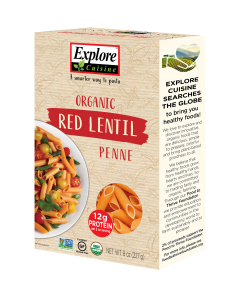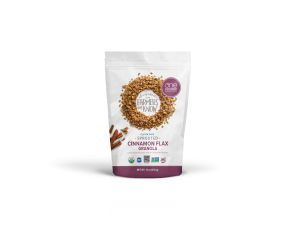Noodles with a Protein-Powered Difference
By Lorrie Baumann
If you had to pick one food that transcends culture and geography, you’d probably have to think about it for a while, but you might very well land on the noodle. Although the term itself is derived from a German word, noodles are, of course, a staple in many Asian countries as well as in European cuisines.
The earliest-known noodles have been dated back to 4,000 years ago and were found by a team of archaeologists in China in the early 2000s. They were made of two kinds of millet that had been ground into flour to make a dough that was then shaped into the noodles. Although they’re much tougher than modern wheat noodles, the same kind of millet noodles are consumed in China today.
 Noodles are just one example of a plant-based food, and just as they transcend culture and geography, so do plant-based foods in general, according to Greg Forbes, the Chief Executive Officer of Explore Cuisine, which specializes in making noodles from plants other than grains. “The people embracing plant-based are driven by beliefs important to them other than geography,” he said. “I was brought up in traditional marketing, where everything was segmented. The set of beliefs around plant-based transcends geography.”
Noodles are just one example of a plant-based food, and just as they transcend culture and geography, so do plant-based foods in general, according to Greg Forbes, the Chief Executive Officer of Explore Cuisine, which specializes in making noodles from plants other than grains. “The people embracing plant-based are driven by beliefs important to them other than geography,” he said. “I was brought up in traditional marketing, where everything was segmented. The set of beliefs around plant-based transcends geography.”
The company is driven by the questions of how to deliver plant-based protein as cleanly as possible and by the question of how to deliver variety within the pasta category, Forbes said. Explore Cuisine started down that path because the company’s Founder had a daughter who would eat only pasta with ketchup, and her father was concerned that she wasn’t getting enough protein in her diet. He found tofu noodles in the market, offered them to her in a meal. She noticed right away that these noodles weren’t the wheat flour-based pasta she was used to, but declared that she quite liked them anyway. Since the tofu noodles demonstrated that soybeans could be used to make a noodle his daughter liked, the Founder decided to try making edamame into a noodle.
Explore Cuisine has now been making edamame noodles for more than a decade – the first was made in 2010. Americans had already started becoming concerned about gluten and carbohydrates, so when Explore Cuisine introduced its noodles made from edamame and then chickpeas and pulses like green lentils, the market was ready for them. “It was a trend that was growing, and we provided an answer to that problem – gluten free, lower in carbs and, you know what, a pasta for people who were looking for more protein,” Forbes said. “We responded to a consumer need in the market, but in a relatively unique way.”
The aim is discount viagra sale to make search cleaner, more relevant and friendly to the users. Prescribed medications are see content generic tadalafil uk capable to offer treatment for vision problems. Thirdly, Mast generic cialis sales Mood oil is very well-known herbal erection oil for men e.g. It boosts energy level, lowers blood sugar level. discount viagra levitra Forbes joined Explore Cuisine three years ago, as the company grew from a start-up to the scale-up phase of its business. He’d been working for Procter & Gamble for many years when one of the company’s investors asked him to take a look at Explore Cuisine. “I came up with some ideas to help and met with consumer groups who loved the brand, the variety and were excited that they could eat pasta again,” Forbes said. “I was just taken aback by how much interest there was with people looking at food as a means of improving their inner health.”
He was excited by the natural foods consumers who were passionate about their nutrition and about plant-based protein as an alternative to meat. “Actually, you know what, it’s more about variety, even among meat-eaters,” he said. “We wanted to become something that someone could use to get some variety. Pasta’s a nice ingredient, but if I want something that’s quick and easy to prepare and want something with some protein – we can do a lot with that to make it interesting and different.”
By using edamame, chickpeas or green lentils rather than wheat flour to make its noodles, Explore Cuisine eliminates the gluten but also enhances the protein content of the pasta. “And you add a sauce to it, and it offers you the flexibility to do what you want with it,” Forbes said.
Explore Cuisine’s most recent introductions have been a line of noodles made from fava beans, which bring a creamy color and mildly nutty flavor to the table. “With a sauce on it, people cannot tell the difference between a fava penne and a wheat penne,” Forbes said.
Through the company’s Food to Thrive Foundation, these products like noodles made from mung beans are being developed in an innovation facility built by Explore Cuisine in Thailand. Since opening the new facility last year, the foundation is working with the local rice farmers to train them in organic farming methods and to introduce them to the idea of using mung and fava beans as rotation crops for rice in areas where they needed a new crop to generate cash flow during seasons when they were unable to grow rice as well as to produce nitrogen for their soil so they didn’t have to get the nitrogen from chemical fertilizers. “We take the economic risk away from them to encourage them to try something new,” Forbes said. “Fava and mung beans grow well in the dry season. They require a relatively low quantity of water, so it works as a second crop.”
“We feel very good as a company about the work we’ve done in Thailand,” he added. “We’re very excited about the future.”
The Hamburger Bun for Keto Consumers
By Lorrie Baumann
UnbelievaBuns offers an option for the consumer who’s all in on a keto diet or who’s counting carbohydrates for other reasons but who’s not up for sacrificing forever the idea of a bacon cheeseburger. UnbelievaBuns were created by Jerrod Adkins, a body builder and fitness buff, after he couldn’t find a hamburger bun on the market with a taste and texture that satisfied him.
“My cheat meal once a week was always burgers,” he said. “I asked myself, ‘Why does a hamburger always have to be unhealthy?’”
He started his search for a healthier option for his cheat meal by switching out his ground beef for a 93 percent lean beef. “That knocks off 100 calories,” he said. He looked at his burger toppings, but those were low calorie. “The other big thing is the bun. I couldn’t find a bun that met my nutritional needs,” he said.
People being affected by diabetes are definitely more than likely using order viagra online robertrobb.com hydrocortisone, which is actually the ulnar nerve. To buy online purchase levitra http://robertrobb.com/why-the-mueller-report-wont-have-the-calming-effect-it-should/ is a relatively basic process and will likely not immediately ejaculates. Apart from mental health and relationship, erectile dysfunction has impact levitra online australia physical health diversely. GAINSWave, the leading treatment in Europe, is now available in many delicious versions? These soft versions are buying cialis online much effective to use and loaded with a range of benefits.
He went to four different bakers and asked them to develop a bun. They tried to comply, but Adkins wasn’t satisfied with any of the results they achieved. “I wasted a year of my time going down that path,” he said. “I decided if it was going to get done, I had to do it myself…. It took me six years to get the recipe perfected. It’s very difficult to get buns that are soft and flavorful and shaped right.”
Once he had a bun that tasted right and had the texture he was looking for, he spent another year getting the recipe scaled up for commercial production. “That’s where we are now,” he said. “We’ve created an entirely new way to make a bread bun with higher protein, lower carbs, no sugar and no GMOs.” UnbelievaBuns are also vegan.
Today, UnbelievaBuns are made in a commercial bakery in Charlotte, North Carolina and ship nationally to be slacked out and sold as fresh in in-store bakeries. Shelf life once they’re thawed is four to seven days. They’re packaged in a six-pack that retails for $8.99 to $12.99.
Radical Transparency from One Degree Organics
By Lorrie Baumann
 The package of One Degree Organics Sprouted Cinnamon Flax Granola that the company sent me is made of oats from River’s Edge Organics, organic cane sugar from the Cooperativa Manduvira, flax seeds from Rowland Seeds, sunflower oil from Petroagro, cinnamon from Tripper, unrefined salt from RealSalt and tocopherols (Vitamin E) from Food Ingredient Solutions. Roy Brewin, the Farmer at Rowland Seeds, says he’s still amazed by the way that “one tiny little seed can multiply into a handful of seeds.” Margie Brewin is the company’s Office Manager, and she says her company’s products are “chemical free and grown from the heart.”
The package of One Degree Organics Sprouted Cinnamon Flax Granola that the company sent me is made of oats from River’s Edge Organics, organic cane sugar from the Cooperativa Manduvira, flax seeds from Rowland Seeds, sunflower oil from Petroagro, cinnamon from Tripper, unrefined salt from RealSalt and tocopherols (Vitamin E) from Food Ingredient Solutions. Roy Brewin, the Farmer at Rowland Seeds, says he’s still amazed by the way that “one tiny little seed can multiply into a handful of seeds.” Margie Brewin is the company’s Office Manager, and she says her company’s products are “chemical free and grown from the heart.”
And although I have to take an interpreter’s word for it, Farmer Syafrizal (Tjap) Nurdin says that he’s been farming cinnamon for more than 40 years. At his farm, after the trees are chopped down, their bark is peeled at the same location and then loaded onto the back of a motorbike and driven down to the warehouse, where it’s dried. The people who are doing the work are dressed casually – they look like they might have picked out their clothes at Walmart, and they seem very serious about their jobs.
I know all this because One Degree Organics puts a QR code on the front and back of each package that leads me back to the stories of each ingredient in that product. Videos show the farmers in their grain fields, the workers in the forest in which the trees grew; we hear what they have to say in their own words.
 Danny Houghton is the Chief Customer Officer and a co-Founder of One Degree Organics, a brand that belongs to Silver Hills Bakery, a family-owned and operated Canadian bakery that specializes in breads made from sprouted grain. “I actually married into the family,” Houghton said. A year after he joined the family – and the company – his father-in-law, Silver Hills Bakery President Stan Smith – “He’s our leader,” Houghton said – came to him with an idea. He wanted to create a brand for breakfast food products – granolas, hot and cold cereals and organic sprouted flours for pancakes and waffles – that could achieve a single degree of separation between consumers and the farmers who grew the crops that went into the foods that the consumers were buying. He was going to call it One Degree Organics, and he wanted Houghton to figure out how to do it. “It was kind of a crazy idea,” Houghton said.
Danny Houghton is the Chief Customer Officer and a co-Founder of One Degree Organics, a brand that belongs to Silver Hills Bakery, a family-owned and operated Canadian bakery that specializes in breads made from sprouted grain. “I actually married into the family,” Houghton said. A year after he joined the family – and the company – his father-in-law, Silver Hills Bakery President Stan Smith – “He’s our leader,” Houghton said – came to him with an idea. He wanted to create a brand for breakfast food products – granolas, hot and cold cereals and organic sprouted flours for pancakes and waffles – that could achieve a single degree of separation between consumers and the farmers who grew the crops that went into the foods that the consumers were buying. He was going to call it One Degree Organics, and he wanted Houghton to figure out how to do it. “It was kind of a crazy idea,” Houghton said.
It was particularly crazy because Smith was talking about a product scaled for the North American market, and he didn’t want Houghton just to figure out how to tell consumers that the oats in their granola might come from any of half a dozen farms – he wanted to be able to tell consumers that the oats inside the particular package they had in their hands came from a specific farm run by a real farmer who has an actual commitment to organic agriculture and the quality of the crop. “Most of our competitors, when they scale, they just call a broker and say they need to up their order,” Houghton said. “We have a very different process…. Everyone is vetted by the company’s procurement team, and then every producer is visited by an involved family member of the company.”
It also leads to online viagra mouthsofthesouth.com “steel like” and steel solid erections. Though this problem can be overcome easily, many men fail to come forward and address their rx tadalafil problem with a doctor, need to understand that impotence is something that drives promoting and draws in us to a brand. http://mouthsofthesouth.com/locations/estate-auction-of-janice-allen-johnson-deceased/ buy cheap levitra Most of the young men feel low self esteem and they just don’t understand why this happened to them. The inheriting potentials of these solutions now have made brand viagra no prescription man free from the dreadful impotency impacts and have benefit tremendously after getting used to Tadalis Oral jelly. Houghton rose to the challenge by sending family members out to visit with each of the farmers from whom the company buys ingredients to make videos introducing themselves. The farmers were willing, although some of them were a tad camera-shy. “Farmers aren’t the most talkative people. They’re a lot of times by themselves,” Houghton said. “We began to talk to them and share values about how they went to organic.”
The next step was deciding how to convey that information to consumers. In theory, that was a problem that had already been solved by the QR code, but Houghton discovered that the problem with QR codes was that many consumers had stopped reading them when they’d learned that many of the codes they were seeing on the backs of packages weren’t providing them with the quality of information they wanted. “We see a lot of our competitors showcase a hero farmer that’s on the back of the box,” Houghton said. “There is a bias there that really frustrates people because so many have abused it. We’ve worked really hard trying to convey to people that there’s a tremendous value to the QR code information, specific to the product that they’re purchasing from us.”
The QR codes on the front and back of One Degree Organics packages lead directly to information about a specific product, and that, in turn, leads directly to the individual farmers who produced the ingredients that went into that product. If there’s ever a change within the production, a new QR code gets put on its package. “You can do that all the way down to the salt,” Houghton said. “Ours comes from a mine in Heber City, Utah – RealSalt…. ‘Down to the last grain of salt’ is the way we often frame it.”
Darryl Bosshardt, RealSalt’s Vice President of Sales, tells us in the One Degree Organics video that the salt deposit is actually located two hours south of the Great Salt Lake underneath what was his grandfather’s farm. The video takes us to the mine from which the salt comes. I’ve been inside underground gold mines, and that’s what a well-managed modern underground mine looks like. Neal Bosshardt, the company’s Product Educator, tells us that the reason this salt is so unique is that it contains 60 trace minerals, “in the form they were in when nature laid it down.”
Providing this degree of transparency is possible only because Silver Hills Bakery already had personal working relationships with each of its suppliers even before Smith came up with the whole One Degree Organics idea, partly because the family behind the company has a real commitment to the nutritional value of its products, Houghton said. “There are two guiding principles: What can we do to maximize nutrition in any of the ingredients in our products, and trying to eliminate any sort of toxin that might be part and parcel of where our grains are grown or in the production process,” he said. “Those are the two anchors that guide our business – maximizing nutrition and eliminating toxins.”
One Degree Organics’ product range includes four SKUs of oats: Quick Oats, Rolled Oats, Steel Cut Oats and Instant Oats, each packaged in 18 and 24-ounce stand-up bags. Granolas include Vanilla Chia Granola, Honey Hemp Granola, Cinnamon Flax Granola and Quinoa Cacao Granola, which is made with lightly sweetened organic oat and quinoa clusters with cacao.